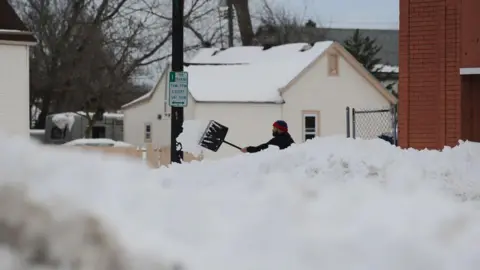 Getty Images
Getty ImagesA lake effect storm pummelled parts of the Great Lakes region Friday night, shutting down highways on one of the biggest travel days of the year in the US.
Communities on the shores of Lake Erie and Lake Ontario – in New York state, Pennsyvlania and Ohio – were left blanketed in snow, with the National Weather Service (NWS) urging residents to stay indoors.
Almost 30 inches of snow had already fallen in spots along Lake Erie, the NWS said Saturday, with up to 6 feet of snow forecast to accumulate by Monday.
As snow piled up, an Artic blast moved through the Northern Plains and the Midwest, pushing bone-chilling air through the region.
From Minnesota to Texas, temperatures were expected to drop by double-digits as cold air swept over the record-warm Great Lakes, bringing the season’s first lake effect snowfall.
Common in the winter in this region of the US and Canada, lake effect snow occurs when very cold air moves across the relatively warm water of the lakes.
These types of storms can cause large – though fairly localised – amounts of snowfall.
“Roads, especially bridges and overpasses, will likely become slick and hazardous,” the NWS said in its Saturday morning forecast, adding that visibility could drop below a quarter mile due to falling and blowing snow. Whiteout conditions are expected in areas throughout the region, the NWS warned.
New York Governor Kathy Hochul declared a state of emergency in 11 of New York’s 62 counties because of the storm. She told Spectrum News on Friday that state officials were “ready for the worst”.
“We are so accustomed to this kind of storm,” Hochul said. “We don’t love it, but it is part of who we are as New Yorkers, especially western New York and the North Country.”
“There will be localized areas that will be paralyzed from the lake snow with some interstates also being greatly impacted,” the National Weather Service in New York said.
Road closures in the region included a stretch of Interstate 90 in Pennsylvania, disrupting travellers between Cleveland, Ohio and Buffalo, New York on one of the busiest travel weekends of the year, following the Thanksgiving holiday on Thursday.
According to AAA, the automobile organization, roughly 80 million people were expected to travel for Thanksgiving this year.




